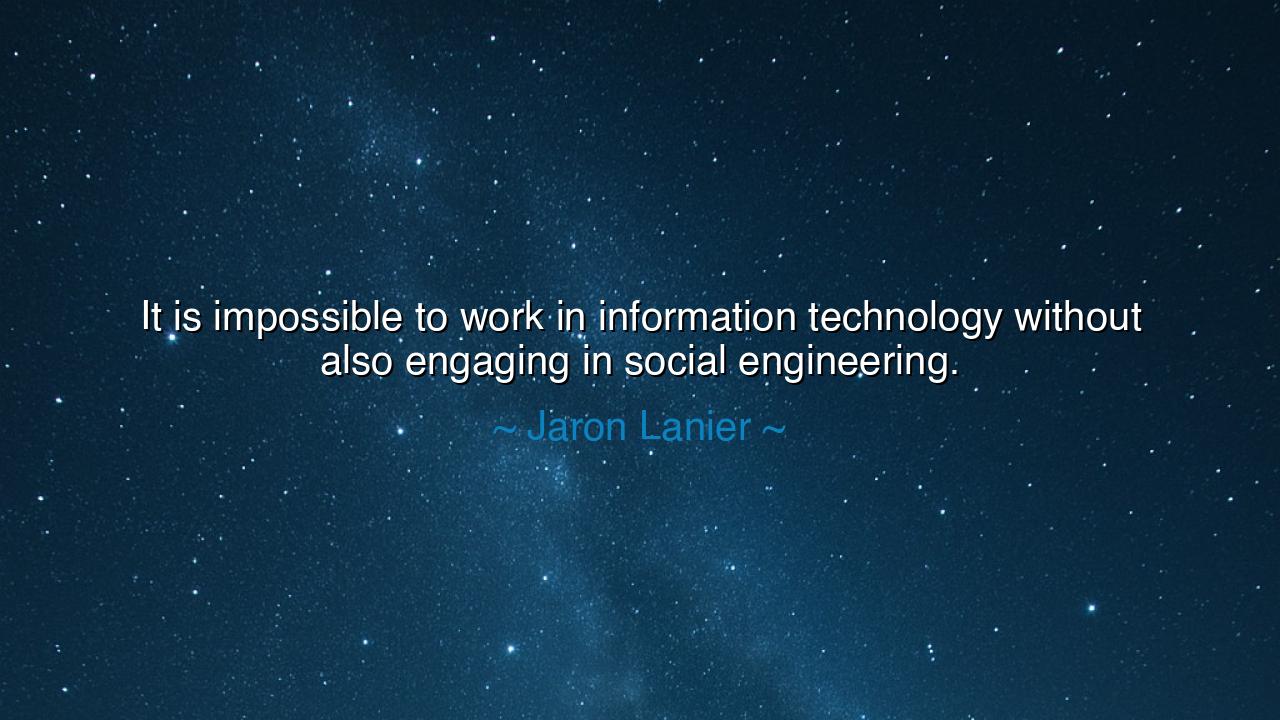
It is impossible to work in information technology without also
It is impossible to work in information technology without also engaging in social engineering.






Jaron Lanier, philosopher of the digital age, once declared: “It is impossible to work in information technology without also engaging in social engineering.” In this statement, he unveils a truth that many wish to ignore: that information technology is never neutral. Every line of code, every platform, every device does not simply serve—it shapes. To create in the digital realm is to design not only machines, but behaviors, communities, and even the very fabric of human thought. Thus, the work of the technologist is also the work of the social engineer, guiding the rhythms of society itself.
The origin of this reflection comes from Lanier’s long career as a pioneer in virtual reality and a critic of the hidden forces in digital culture. He witnessed firsthand how technologies designed for utility quickly transformed into tools of persuasion, influence, and control. The platforms of communication—once celebrated as neutral highways of knowledge—soon became architects of attention, bending human behavior toward endless scrolling, shallow engagement, and subtle manipulation. His words serve as both observation and warning: the creator of tools cannot escape responsibility for the societal consequences of those tools.
History offers many mirrors to this lesson. Consider the invention of the printing press. Gutenberg’s device was not simply a machine; it transformed the world. It broke the monopoly of the Church over scripture, spread knowledge across continents, and ignited revolutions. Yet it also unleashed division, propaganda, and war. The printer was not only a craftsman of ink and type, but a hidden social engineer, reshaping belief and identity. In the same way, the builders of today’s networks and algorithms are architects of human destiny, whether or not they admit it.
Lanier’s words also remind us of the power and peril of influence. Information technology is now woven into the pulse of daily life, guiding how we speak, learn, and connect. A social network is not just a tool for conversation—it changes the nature of friendship. A search engine does not simply return knowledge—it decides which truths are most visible. A recommendation algorithm does not merely suggest—it can tilt entire societies toward unity or division. To engage with technology is to enter the domain of power over minds and cultures.
This truth demands a great moral responsibility from those who work in the field. The technologist is not merely an engineer but a kind of unseen legislator, shaping laws of behavior through design. When platforms encourage haste, people lose depth; when systems reward outrage, anger becomes the norm; when tools nurture curiosity, wisdom has room to grow. Thus, the ethical weight upon the creator of information systems is immense, for they plant seeds in the very soil of human society.
The lesson for us is clear: we must recognize that tools are never just tools. To create, share, or even use technology is to shape the world. Do not be naïve and think that your work in digital realms affects only machines—it affects hearts, minds, and communities. Approach it, therefore, with reverence. Ask not only, Does this function? but also, What does this teach? What does this encourage? What kind of society does this cultivate? In this questioning lies the wisdom that prevents power from sliding into tyranny.
Practical actions may be taken. If you are a creator, build with responsibility, seeking to uplift rather than exploit. If you are a leader, govern technologies with justice, mindful of their effect upon society. If you are a user, engage consciously, resisting manipulation and choosing with intention what you allow to shape your spirit. For in this age, all are touched by social engineering, and the only safeguard is awareness and virtue.
Thus, let Jaron Lanier’s words echo through the ages: to touch technology is to touch society itself. No engineer escapes the role of shaping humanity, no invention remains apart from culture. Therefore, let us build with wisdom, for the structures we create in code will one day be the invisible scaffolding of civilization.






AAdministratorAdministrator
Welcome, honored guests. Please leave a comment, we will respond soon